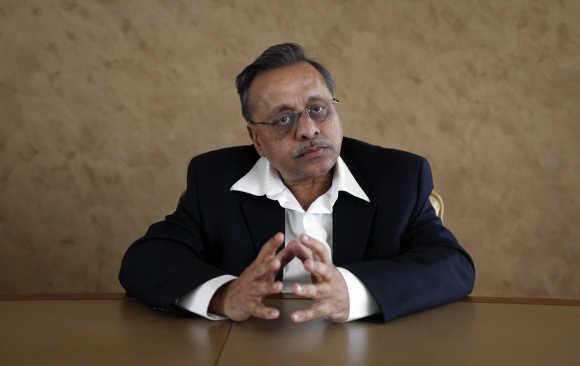
Midway through the lunch, Lalit Jalan recites a verse from the Bhagavad Gita, "Do your duty, to the best of your abilities. Let the result be left to the Lord." The invocation of the Lord has been prompted by our query why Reliance Infrastructure (R-Infra), the company he heads, keeps on getting into face-offs with state government agencies, write Shyamal Majumdar and Katya Naidu.
But make no mistake. Just like his friend-cum-boss Anil Ambani, Jalan has no real intention of leaving the result just to the Lord. The 56-year-old CEO is fighting it out even though he feels infrastructure has become a bad word today and the whole sector is being decimated.
"The confidence of Indian promoters has to be brought back. The honeymoon period is clearly over," he says.
The main reason for this, Jalan says, is the reluctance to take decisions ("everyone seems to be scared about what if somebody wakes up 10 years later and questions the decisions"), the red-tape ("you need millions of approvals even for minor things") and lack of a centralised clearance authority ("the power ministry or the National Highway Development Authority has no control over land, over finance, so what do they have control over?").
...
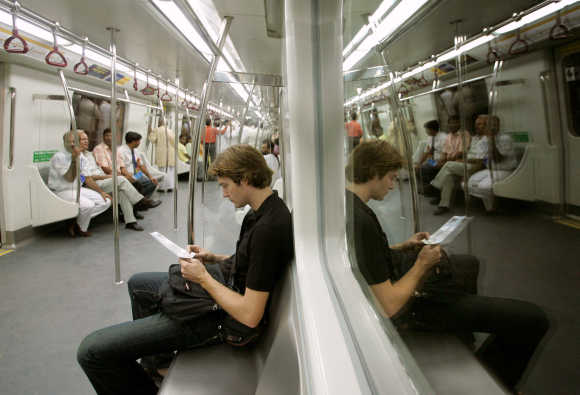
He also blames some of the private sector companies that bid at a crazy price just to bag projects somehow. We are at Fifty Five East, a buffet-only restaurant at the basement of Grand Hyatt in Mumbai's Santacruz.
The name of the restaurant is interesting, though the inspiration for the name is more prosaic: it's named after the area code and direction. The hotel is in Santacruz East, for which the pincode is 400055.
Jalan orders an assortment of starters and fresh lime soda and explains the reasons for the run-ins we had referred to. Unfortunately, the juicier part of the conversation, he insists, should be off the record. To begin with, Jalan refuses to be blamed for the halt in the Delhi airport metro express operations in July.
The civil works, he says, were to be done by the Delhi Metro Rail Corporation and the rest of the work - rolling stock, signalling, rakes - was to be completed by R-Infra. At the end of the first year, when R-Infra started inspecting the line, it found certain defects in the civil structure, mainly the bearings.
The advice it got from a reputed consultant was this: hold a complete inspection of the entire track and get the bearings rectified keeping in mind the safety of the passengers since the trains run at 120 km/hr.
...
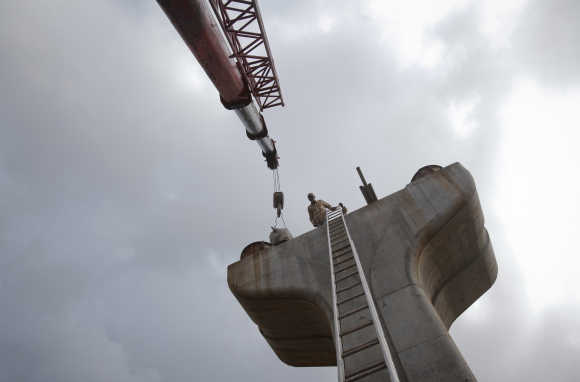
But DMRC advised R-Infra to run the trains at a "reduced speed of its choice" - which, Jalan says, was unacceptable. The company's stand was, in fact, vindicated when the railways found that almost 92 per cent of the bearings used in the civil structure were defective.
Operations will start only when the Commissioner for Metro Rail Safety certifies it as safe and this could take up to six months, he adds. What about the raging controversy over the Mumbai Metro?
Jalan says while phase one of the project will be over by March, R-Infra is not going ahead with the 32-km second line for many reasons, including inordinate delays over allotment of land and construction area (also called the right of way) and the Mumbai Metropolitan Development Authority's failure to provide car depot land plots.
Without this, work cannot start. Besides, the Bombay Municipal Corporation has failed to clear the commercial development rights, without which the financial viability of the project will be impacted.
R-Infra was supposed to get 4,000 square metres of space on each of the 27 stations for commercial use. Our conversation is interrupted by the steward's reminder that there is just an hour left for lunchtime to be over. Jalan goes for Thai food first - chicken green curry and steamed rice - but soon shifts to roti, sabzi and chicken.
...
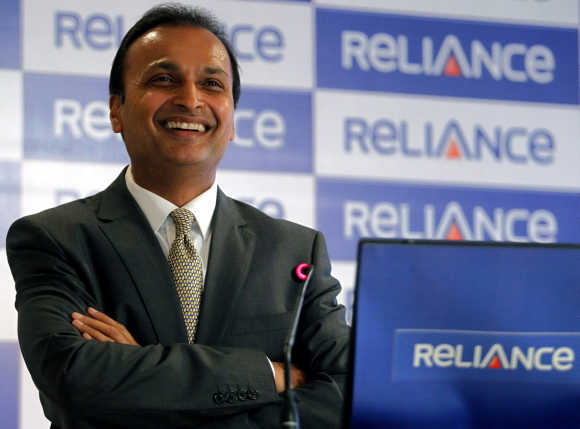
A Marwari and non-vegetarian is a rare combination; Jalan says the credit for his conversion goes to the no-time-to-cook days at Wharton University, where he was studying for a dual degree - accountancy during the day and computer science at night - and teaching, which was mandatory to keep his scholarship going.
That's something Jalan couldn't afford to let go since an MBA from a good school like Wharton "costs an arm and a leg". We are curious to know how Anil (Ambani), who studied at Wharton around the same time and became a close friend, manage to remain a strict vegetarian.
"Well, he was a strict disciplinarian, used to cook himself and went to bed sharp at 10.30pm every day - unlike us," Jalan says. We go back to the Mumbai Metro and ask whether R-Infra can have any excuse for the inordinate delay in completion of the first phase of the metro project (the 12-km project has taken five years).
Jalan says everyone forgets that the same company built the 26-km Delhi metro project in two-and-a-half years and nobody bothered to find out why a project half the size is taking double the time in Mumbai.
...

The constraints in Mumbai were daunting. "In many areas, we could build pillars only late in the night, that too only for two hours, out of which one hour went into mobilisation and demobilisation of machinery and workforce," he adds.
Jalan sees a peculiar bias against the private sector in this country. For example, 10 people die every day in Mumbai's suburban railway system, which is unfortunate but is a fact.
"But I have told my team repeatedly, God forbid, if one person dies, you will be on page 1 of all newspapers, while 10 people dying every day in the suburban railways will not even find mention in any newspaper. I may be 25 times better than the public sector, but any mishap in a private sector project will be blown out of proportion," he adds.
R-Infra is also out of the showpiece Worli-Haji Ali sea link project in Mumbai due to irreconcilable differences over issues such as payment of viability gap fund.
R-Infra wanted a guarantee from the state government, not the cash-strapped Maharashtra State Road Development Corporation, along with a written promise that no alternative route would be built along the link, but the state government was not agreeable.
"Not proceeding with the sea link is a huge disappointment as Anil himself wanted to make it a world-class project," admits Jalan.
...
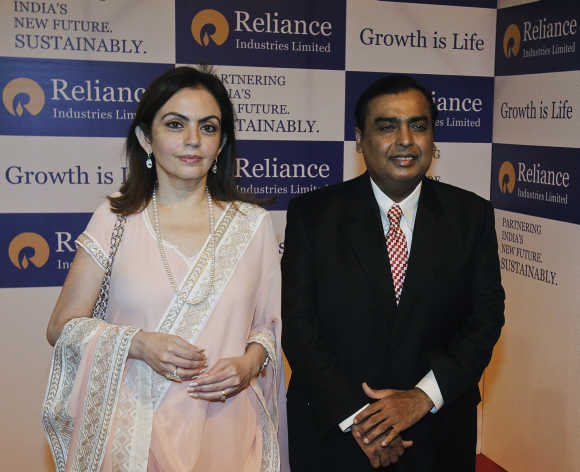
The tone, however, brightens when he talks about road projects. The company has started collecting tolls on seven projects and expects to start collecting from another three this year and one more next year.
The lunch is over, but our guest is in a mood to talk. What's his equation with the older Ambani, we ask. Jalan says he has had a very warm relationship with Mukesh since the days he used to visit the Ambani home as Anil's friend.
"My first experience of real scale was when I attended Mukesh's wedding. There were over 40,000 guests," he says.
He had visited the Ambani home many times later - first as Anil's Wharton schoolmate and then during his days in Kolkata where he set up his own business after a one-year stint with GE in the US.
But it was a complete surprise when Anil suggested he join Reliance. Though working for someone was contrary to the Marwari tradition in those days, Jalan took the plunge because he was impressed by the entrepreneurial nature of the job that Dhirubhai and his two sons discussed with him.
The respect must have been mutual; Jalan was the winner of Directors' Honours and Dean's List at Wharton apart from the Distinguished Alumni Award from the Indian Institute of Technology, Kanpur.
...
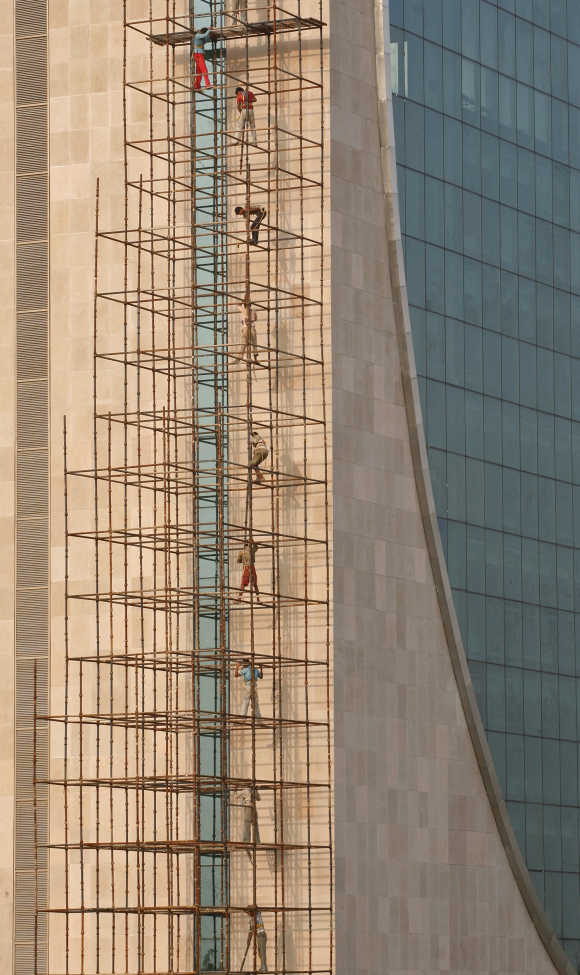
He was also showcased as one of the 15 achievers from the IIT system at the first PAN IIT meet in California in 2003. So, at 39, he became the CEO of Reliance's polypropylene business. The journey since then has been spectacular - steering BSES, a Rs 1,000-crore (Rs 10 billion) company, to the Rs 35,000-crore (Rs 350 billion) R-Infra.
The long hours spent on academics from a very young age also helped him keep pace with Mukesh and Anil's working hours. "When they were working together, Anil would be in office by 9.30 and leave by seven, while Mukesh would keep a 12 to 11 routine. I used to work with both on the polypropylene business and ended up working from 9.30am to 11pm on most days," Jalan says with a laugh.
As we wait at the portico for his Honda Accord, we ask whether it's difficult to work for a boss who is also a friend. Jalan's answer is well-rehearsed - both of them know where to draw the line between personal and professional relationship. His only regret, however, is that he hasn't been able to follow Anil's fitness regimen.
"I have enough reasons for skipping daily exercise. But I know these are lame excuses - if President Obama can find time to exercise, so can I," Jalan says. The Lord would surely be pleased with his sense of humour.